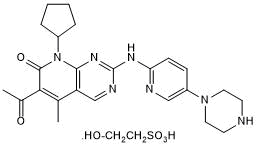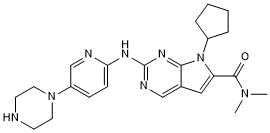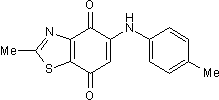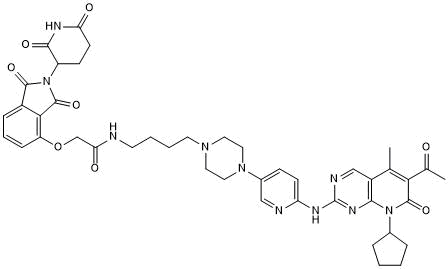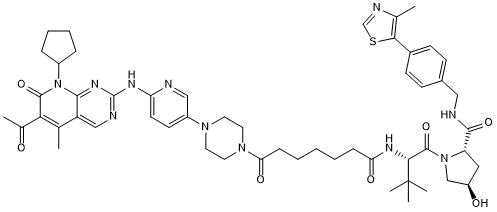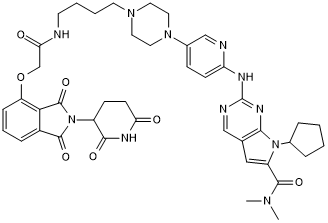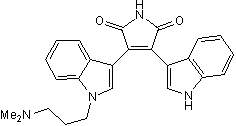CDK4 Products
Cyclin-dependent Kinase 4 (CDK4) is a 303 amino acid (aa) member of the Ser/Thr kinase family with a predicted molecular weight of 33.7 kDa. The human protein shares 94% and 95% aa sequence identity with the mouse and rat orthologs, respectively. CDK4 shuttles between the cytoplasm and nucleus as part of its role in cell cycle regulation. It promotes the transition from G1 to S phase by phosphorylating and inactivating RB1. Activation of CDK4 requires binding of a D-type Cyclin and phosphorylation of Thr172 by the CAK kinase complex. Calcineurin, a phosphatase enzyme, negatively regulates CDK4 by dephosphorylating Thr172. The CDK4/Cyclin D complex is also negatively regulated by p21/CIP1/CDKN1A and p27/Kip1. Loss of both CDK4 and CDK2 increases neural stem cell differentiation. CDK4 inhibition decreases homologous recombination and increases non-homologous end joining, suggesting that CDK4 may also promote error free DNA repair. CDK4 also likely plays a significant role in cancer. CDK4 may be useful as a prognostic marker for hepatocellular carcinoma and its kinase activity has been reported to promote the progression of T cell acute lymphoblastic leukemia.
39 results for "CDK4" in Products
39 results for "CDK4" in Products
CDK4 Products
Cyclin-dependent Kinase 4 (CDK4) is a 303 amino acid (aa) member of the Ser/Thr kinase family with a predicted molecular weight of 33.7 kDa. The human protein shares 94% and 95% aa sequence identity with the mouse and rat orthologs, respectively. CDK4 shuttles between the cytoplasm and nucleus as part of its role in cell cycle regulation. It promotes the transition from G1 to S phase by phosphorylating and inactivating RB1. Activation of CDK4 requires binding of a D-type Cyclin and phosphorylation of Thr172 by the CAK kinase complex. Calcineurin, a phosphatase enzyme, negatively regulates CDK4 by dephosphorylating Thr172. The CDK4/Cyclin D complex is also negatively regulated by p21/CIP1/CDKN1A and p27/Kip1. Loss of both CDK4 and CDK2 increases neural stem cell differentiation. CDK4 inhibition decreases homologous recombination and increases non-homologous end joining, suggesting that CDK4 may also promote error free DNA repair. CDK4 also likely plays a significant role in cancer. CDK4 may be useful as a prognostic marker for hepatocellular carcinoma and its kinase activity has been reported to promote the progression of T cell acute lymphoblastic leukemia.
Recombinant Monoclonal Antibody
| Reactivity: | Human |
| Details: | Rabbit IgG Kappa Monoclonal Clone #CDK4/7987R |
| Applications: | IHC |
| Reactivity: | Human, Mouse, Rat, Bovine, Feline |
| Details: | Rabbit IgG Polyclonal |
| Applications: | IHC, WB, ICC/IF, Flow, Simple Western |
| Reactivity: | Human, Mouse |
| Details: | Goat IgG Polyclonal |
| Applications: | WB, Simple Western, ICC |
| Reactivity: | Human |
| Details: | Mouse IgG1 kappa Monoclonal Clone #4F11 |
| Applications: | WB, ELISA, ICC/IF, KD |
| Reactivity: | Human, Mouse, Rat |
| Details: | Mouse IgG2A Monoclonal Clone #DCS-31 |
| Applications: | IHC, WB, ICC/IF, IP, MA |
| Reactivity: | Human, Mouse |
| Details: | Mouse IgG1 kappa Monoclonal Clone #2G7 |
| Applications: | WB, ELISA, ICC/IF |
| Reactivity: | Human, Mouse |
| Details: | Mouse IgG1 kappa Monoclonal Clone #8A10 |
| Applications: | WB, ELISA, ICC/IF |
| Reactivity: | Human |
| Details: | Rabbit IgG Polyclonal |
| Applications: | ICC/IF |
Recombinant monoclonal antibody expressed in HEK293F cells
| Reactivity: | Human |
| Details: | Rabbit IgG Monoclonal Clone #8F2 |
| Applications: | WB, ELISA, IP |
Recombinant monoclonal antibody expressed in HEK293F cells
| Reactivity: | Human |
| Details: | Rabbit IgG Monoclonal Clone #8H4 |
| Applications: | WB, ELISA |
| Applications: | WB |
| Applications: | AC |
| Reactivity: | Human |
| Details: | Mouse IgG2a Kappa Monoclonal Clone #6D10 |
| Applications: | WB, ELISA |
| Reactivity: | Human |
| Details: | Mouse IgG2a Kappa Monoclonal Clone #6D10 |
| Applications: | WB, ELISA |
| Reactivity: | Human |
| Details: | Mouse IgG2a Kappa Monoclonal Clone #6D10 |
| Applications: | WB, ELISA |
| Reactivity: | Human |
| Details: | Mouse IgG2a Kappa Monoclonal Clone #6D10 |
| Applications: | WB, ELISA |
| Reactivity: | Human |
| Details: | Mouse IgG1 Monoclonal Clone #CL8102 |
| Applications: | IHC, WB, ICC/IF |
Potent cdk4 and cdk6 inhibitor; brain penetrant
| Alternate Names: | Palbociclib |
| Chemical Name: | 6-acetyl-8-cyclopentyl-5-methyl-2-[[5-(1-piperazinyl)-2-pyridinyl]amino]pyrido[2,3-d]pyrimidin-7(8H)-one isethionate salt |
| Purity: | ≥98% (HPLC) |
Dual cdk4/cdk6 inhibitor; orally bioavailable
| Alternate Names: | LEE-011 |
| Chemical Name: | 7-Cyclopentyl-N,N-dimethyl-2-[[5-(1-piperazinyl)-2-pyridinyl]amino]-7H-pyrrolo[2,3-d]pyrimidine-6-carboxamide |
| Purity: | ≥98% (HPLC) |
SETD8 inhibitor; also CDK4 inhibitor
| Chemical Name: | 2-Methyl-5-[(4-methylphenyl)amino]-4,7-benzothiazoledione |
| Purity: | ≥98% (HPLC) |
Selective Cdk4/6 Degrader (PROTAC®
| Chemical Name: | N-[4-[4-[6-[(6-Acetyl-8-cyclopentyl-7,8-dihydro-5-methyl-7-oxopyrido[2,3-d]pyrimidin-2-yl)amino]-3-pyridinyl]-1-piperazinyl]butyl]-2-[[2-(2,6-dioxo-3-piperidinyl)-2,3-dihydro-1,3-dioxo-1H-isoindol-4-yl]oxy]acetamide |
| Purity: | ≥98% (HPLC) |
Cyclin D1, CDK4/6 and cyclin D3 Degrader (PROTAC®)
| Chemical Name: | (2S,4R)-1-((S)-2-(7-(4-(6-((6-Acetyl-8-cyclopentyl-5-methyl-7-oxo-7,8-dihydropyrido[2,3-d]pyrimidin-2-yl)amino)pyridin-3-yl)piperazin-1-yl)-7-oxoheptanamido)-3,3-dimethylbutanoyl)-4-hydroxy-N-(4-(4-methylthiazol-5-yl)benzyl)pyrrolidine-2-carboxamide |
| Purity: | ≥98% (HPLC) |
Selective Cdk4 Degrader (PROTAC®)
| Chemical Name: | 7-Cyclopentyl-2-[[5-[4-[4-[2-[[2-(2,6-dioxopiperidin-3-yl)-1,3-dioxoisoindolin-4-yl]oxy]acetamido]butyl]piperazin-1-yl]pyridin-2-yl]amino]-N,N-dimethyl-7H-pyrrolo[2,3d]pyrimidine-6-carboxamide |
| Purity: | ≥98% (HPLC) |
Protein kinase C inhibitor
| Alternate Names: | Gö 6850,Bisindolylmaleimide I |
| Chemical Name: | 2-[1-(3-Dimethylaminopropyl)indol-3-yl]-3-(indol-3-yl) maleimide |
| Purity: | ≥98% (HPLC) |
HMG-CoA reductase inhibitor
| Chemical Name: | (1S,3R,7S,8S,8aR)-1,2,3,7,8,8a-Hexahydro-3,7-dimethyl-8-[2-[(2R,4R)-tetrahydro-4-hydroxy-6-oxo-2H-pyran-2-yl]ethyl]-1-naphthalenyly-2,2-dimethyl butanoate |
| Purity: | ≥98% (HPLC) |


![Immunocytochemistry/ Immunofluorescence: CDK4 Antibody [NBP1-31308] Immunocytochemistry/ Immunofluorescence: CDK4 Antibody [NBP1-31308]](https://resources.bio-techne.com/images/products/CDK4-Antibody-Immunocytochemistry-Immunofluorescence-NBP1-31308-img0010.jpg)

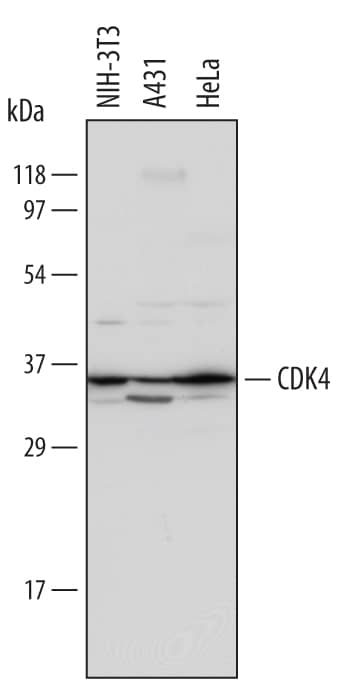
![Western Blot: CDK4 Antibody (4F11) [H00001019-M03] Western Blot: CDK4 Antibody (4F11) [H00001019-M03]](https://resources.bio-techne.com/images/products/CDK4-Antibody-4F11-Western-Blot-H00001019-M03-img0012.jpg)
![Western Blot: CDK4 Antibody (DCS-31) [NB120-6315] Western Blot: CDK4 Antibody (DCS-31) [NB120-6315]](https://resources.bio-techne.com/images/products/CDK4-Antibody-DCS-31-Western-Blot-NB120-6315-img0001.jpg)
![Western Blot: CDK4 Antibody (2G7) [H00001019-M04] Western Blot: CDK4 Antibody (2G7) [H00001019-M04]](https://resources.bio-techne.com/images/products/CDK4-Antibody-2G7-Western-Blot-H00001019-M04-img0009.jpg)
![Western Blot: CDK4 Antibody (8A10) [H00001019-M09] Western Blot: CDK4 Antibody (8A10) [H00001019-M09]](https://resources.bio-techne.com/images/products/CDK4-Antibody-8A10-Western-Blot-H00001019-M09-img0010.jpg)
![Immunocytochemistry/ Immunofluorescence: CDK4 Antibody [NBP2-58877] Immunocytochemistry/ Immunofluorescence: CDK4 Antibody [NBP2-58877]](https://resources.bio-techne.com/images/products/CDK4-Antibody-Immunocytochemistry-Immunofluorescence-NBP2-58877-img0001.jpg)
![Immunoprecipitation: CDK4 Antibody (8F2) [NBP3-26664] - CDK4 Antibody (8F2)](https://resources.bio-techne.com/images/products/nbp3-26664_rabbit-cdk4-mab-8f2-262202413221518.jpg)
![Western Blot: CDK4 Antibody (8H4) [NBP3-26665] - CDK4 Antibody (8H4)](https://resources.bio-techne.com/images/products/nbp3-26665_rabbit-cdk4-mab-8h4-282202411442648.jpg)
![Western Blot: CDK4 Overexpression Lysate [NBL1-09039] Western Blot: CDK4 Overexpression Lysate [NBL1-09039]](https://resources.bio-techne.com/images/products/Cdk4-Overexpression-Lysate-Adult-Normal-Western-Blot-NBL1-09039-img0002.jpg)

